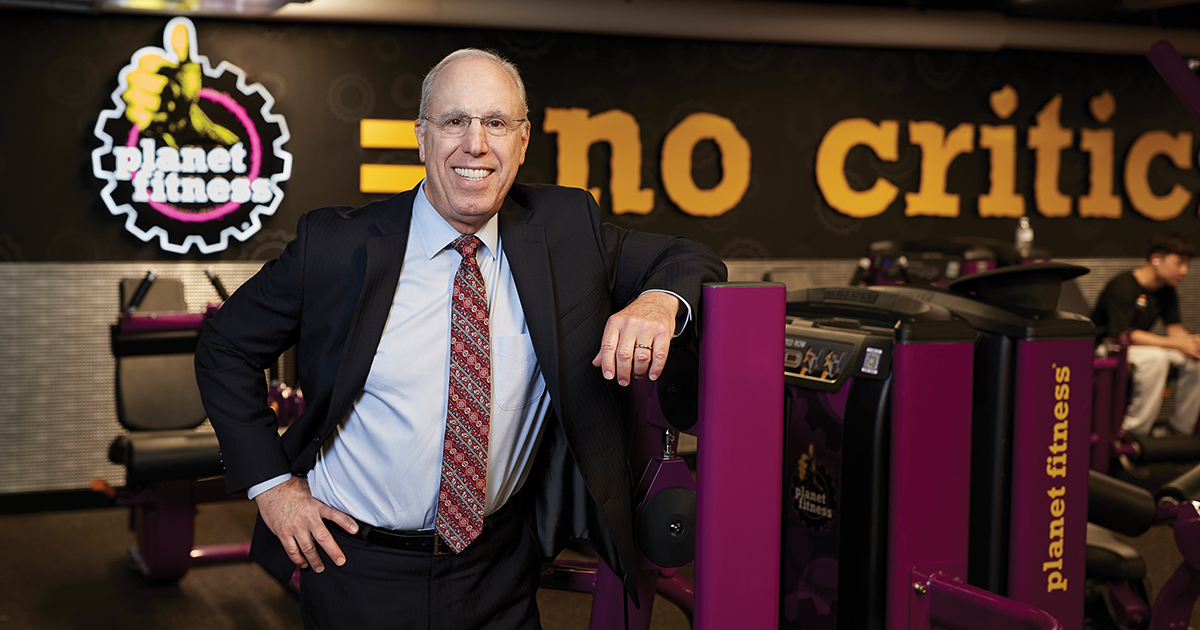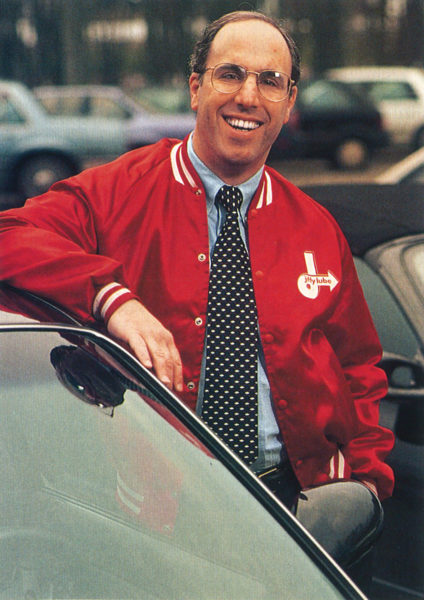The Franchising Journey of President Spinelli

The franchising journey of Stephen Spinelli Jr. MBA’92, PhD begins in a nursing home in Clinton, Iowa, with an opportunistic phone call.
It’s 1978, and the future Babson College president is the administrator at Clinton Retirement Village, which was owned by his former football coach at Western Maryland (now McDaniel) College. James Hindman, a successful entrepreneur who had built his fortune in elder care before becoming a football coach, called Spinelli with a proposal to leave Iowa and the nursing home.
READ MORE: The Future of Franchising
Hindman and five other former players were searching for a high-potential, big-money venture, and they wanted Spinelli on their new team. “We were getting together to do something big,” Spinelli says.
The coach and his protégés soon discovered a hidden gem in Utah—a tiny chain of mom-and-pop stores for quick-service automotive oil change called Jiffy Lube. With that, Spinelli set himself on the path to becoming not only a successful entrepreneur, but also an innovative leader who continues to passionately advance the field of franchising in business and higher education four decades later.
Accelerating Innovation
After accepting Hindman’s invitation, Spinelli joined his new partners in a Utah hotel room, where they dashed together an unsophisticated business plan to purchase the fledgling chain. “Mostly with the coach’s money, but everybody put in some money,” he says. “I borrowed money. Everybody was a shareholder of that team.”
Spinelli and his new wife, Carol, moved to Ogden, Utah, where he began to develop Jiffy Lube into the iconic, ubiquitous brand we all know. “It was a big adventure. I was having fun, and I learned the business,” says Spinelli, who would observe every nuance of how it worked and dictate his findings into a handheld recorder. “I wrote the operations manual that detailed exactly how a Jiffy Lube should look and function. I would draw diagrams, and my wife typed it for me.”
They rebranded it Jiffy Lube International Inc., with the objective to grow and grow fast. They determined the potential market for quick-lube service—how many cars in the United States (120 million), how often people change their oil (2.8 times a year)—and targeted opening 2,000 stores, each requiring an investment of more than $1 million. “So, we need $3 billion. Anybody got $3 billion?” Spinelli says. “We knew we had to find resources. How do you match the resources to the ambition? We have to franchise.”
“It was a big adventure. I was having fun, and I learned the business. I wrote the operations manual that detailed exactly how a Jiffy Lube should look and function.”
Babson President Stephen Spinelli Jr. MBA’92, PhD
They began selling territories and creating multiple layers of franchising. “We developed a pretty sophisticated franchise plan,” Spinelli says, describing it as the ability to marry the opportunity with the urgency of the market and the capital required to exploit it. “That creates an ability to have a brand, and a brand that you can scale.”
The Jiffy Lube brand was built on a simple but revolutionary promise—10 minutes, 14 points of service, no appointment necessary. “We had to live to that; 10 minutes and 3 seconds was a failure,” he says. Scaling that brand also created efficiencies through the supply chain—and negotiating leverage. In the early days, Spinelli went to Pennzoil, its oil supplier, with a tough offer to invest or lose a major customer. So, Pennzoil wrote a big check and helped fuel Jiffy Lube’s growth.
The collaboration among franchisees also spurred innovation. The precise placement of the building to maximize traffic flow, the exact height of the platform to increase leverage on a wrench, anything to create efficiency. As the franchisor, Spinelli and his partners could help accelerate those innovations across the country. “You could feel an explosion of excellence happening in the franchise system,” he says.
From Franchisor to Franchisee
As Jiffy Lube grew and he saw the power and potential of franchises, Spinelli made two critical decisions that changed the path of his journey.

First, he decided to transition from franchisor to franchisee. “That’s where the money is made,” he says. Second, he decided he needed more education. So, he moved back near his hometown of Springfield, Massachusetts, and began pursuing his MBA at Babson College part time while becoming the largest owner of Jiffy Lube franchises.
“Some people, especially back then, thought franchising was not entrepreneurial, but that’s crazy,” he says. “I needed to sort through these instincts and experiences in a real curriculum, a real pattern of thinking. I worked very hard to learn the entrepreneurial process.” He found mentors in the likes of pioneering entrepreneurship professors William Bygrave and Jeffry Timmons. “They just opened my eyes.”
At the same time, Jiffy Lube was transitioning, too, and was acquired by Pennzoil in 1991. So, as its largest franchisee with burgeoning aspirations and a lot of leverage, Spinelli returned to Pennzoil with another tough offer: Buy me out. So, Pennzoil wrote another check and purchased all of his Jiffy Lube franchises.
“I hadn’t even finished my MBA,” he says, “and I decided that I wanted to be in academia.”
Educator and Expert
After earning his MBA in 1992, Spinelli stayed at Babson as an entrepreneurship professor, chair of the Entrepreneurship Division, vice provost, and director of The Arthur M. Blank Center for Entrepreneurship.
He taught a course on franchising, wrote his PhD dissertation on franchising (at Imperial College London), and co-wrote the book Franchising: Pathway to Wealth Creation with Robert M. Rosenberg, the longtime CEO of Dunkin’ Donuts. A full-fledged franchising expert, Spinelli resisted countless opportunities to return to franchising as an investor or consultant or board member—until another opportunistic phone call.
READ MORE: Alumni Faces of Franchising
It’s 2011, and Spinelli now is the president of Philadelphia University. Craig R. Benson ’77, H’03, a longtime friend and former governor of New Hampshire, needed advice at Planet Fitness, where he owned several franchises. Spinelli was intrigued and offered his expertise. A year later, Spinelli was invited to join the Planet Fitness board of directors, and he currently serves as its chairman—an advantageous opportunity for a college president to deal with real-world business issues.
“I’ve got to be in the marketplace bumping into problems,” Spinelli says. “It toughens you up, it smartens you up, it puts you in networks, and it makes you a better manager and strategist.”
Franchising Legacy
Spinelli, of course, is bullish on the future of franchising. “I see it burgeoning in a lot of ways,” he says. “It’s a fascinating, flexible entrepreneurial tool, but you better be entrepreneurial, you better be innovative, you better have relational skills.”
The franchise entrepreneurs of the future will need more specialized education to keep pace. An entrepreneurial school such as Babson is uniquely positioned to deliver, which brings Spinelli’s franchising journey full circle. He returned to Babson as president in 2019, and last year, the College opened the Tariq Farid Franchise Institute.
“Franchising will be a normal part of a business school curriculum. Every college will have a course in franchising, and many will have centers dedicated to franchising. I absolutely believe it.”
Babson President Stephen Spinelli Jr. MBA’92, PhD
“Franchising will be a normal part of a business school curriculum,” he says. “Every college will have a course in franchising, and many will have centers dedicated to franchising. I absolutely believe it.”
Spinelli also cites the large number of Babson alumni who are in franchising, either as a franchisor or franchisee, or in the franchising ecosystem. That makes the new institute a natural fit for Babson—and for Spinelli’s franchising legacy.
Instead of scaling Jiffy Lube franchises, he envisions the Tariq Farid Franchise Institute accelerating its research and expanding the concepts that drive franchising education across business schools.
“It makes complete sense,” he says. “It’s about entrepreneurship. It’s about growth. It’s about high-potential ventures. It’s about empowering people. It is Babson.”
Posted in Community




